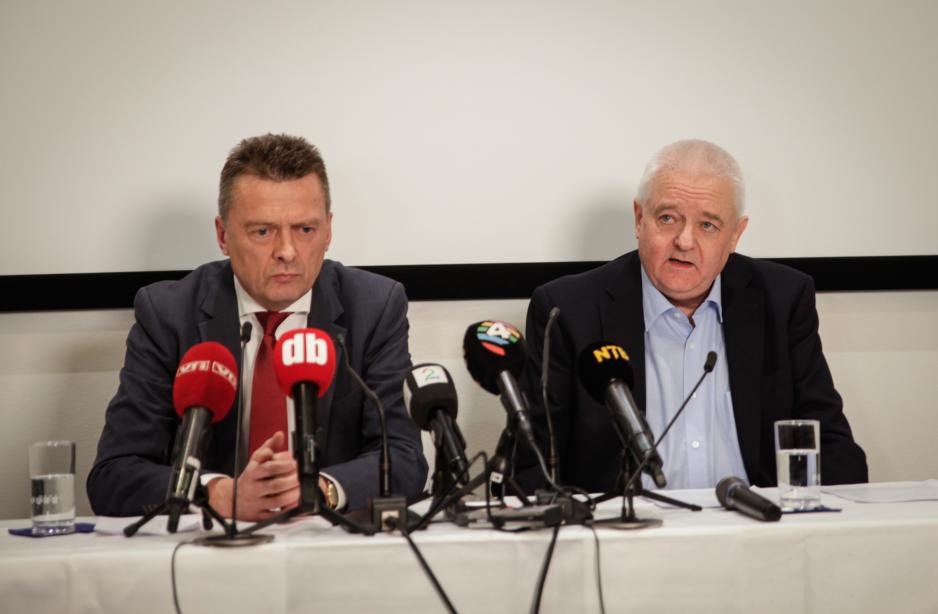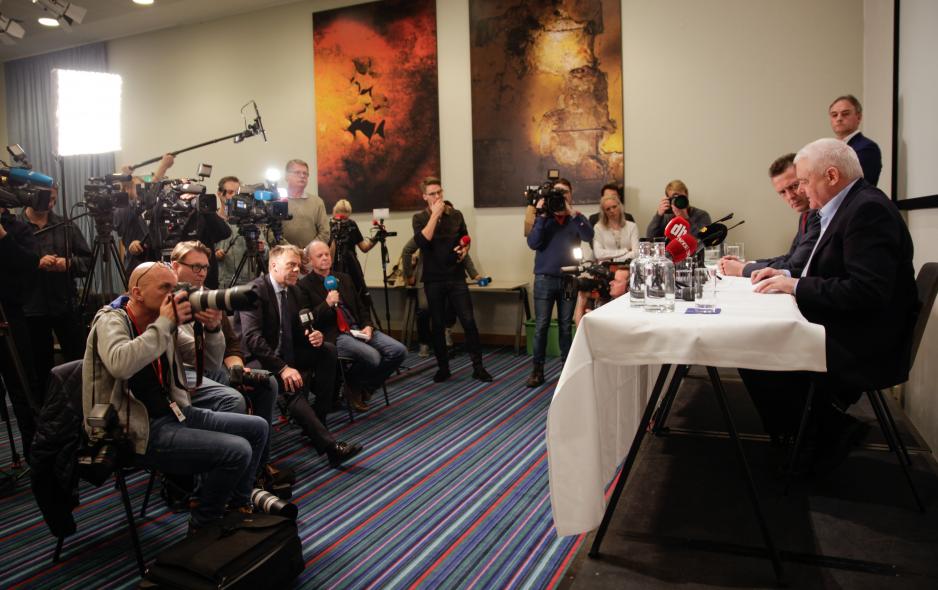Frode Berg: I Am Convicted of Espionage, But I Am Not A Spy

Frode Berg (right) and his attorney Brynjulf Risnes met the press at Gardermoen Tuesday night. Photo: Lina Winge, Sør-Varanger Avis
I feel seriously misled, Frode Berg, who has been convicted of espionage, says about the assignments he allegedly has conducted for the Norwegian intelligence services. Berg says he is convicted of espionage, but that he is no spy.
On Tuesday night, Frode Berg met the press for the first time since his being pardoned and allowed to travel home to Norway following almost two years in Russian prison.
The retired border inspector from Kirkenes was arrested in Moscow in December 2017 and later sentenced to 14 years in prison for espionage. Last Friday, he was granted a pardon and handed over to Norwegian authorities in Lithuania as part of an agreement between Lithuania and Russia.
At the Gardermoen press conference he spoke for the first time about what really happened before he was apprehended by the Russian police.
Says it was a friendly favor
Berg says he was contacted in 2014 by someone he knew well from his former work community, the Border Commission in Kirkenes. This man shall have asked Berg if he could do him a favor.
- I knew he was related to the intelligence services, however, it all appeared rather innocent to me. He was someone I trusted, Berg said in an introductory speech he had prepared.
- After some time, I got the sense that this was not just a friendly favor.
He says he conducted assignments consisting of handing over envelopes to a given address several times, but that he grew uncertain over time as his Norwegian contacts were unwilling to answer questions about what this was really a part of.
Berg claims he had tried to withdraw twice, but “felt pressured” and said yes to go on one final trip. That was when he got arrested.
- I knew nothing bout the purpose or background of the letters I handed over, and I was not informed about any risk whatsoever, Berg says.
- I feel seriously misled and that is a grave breach of trust from the respective people in the intelligence services.
Berg stressed that he never received any payment for the job he did. At the press conference, however, it came out that he has sent travel invoices for hotels and flights for these trips to his contact in the intelligence services.

After 23 months in the Lefortovo prison in Moscow, Frode Berg returned to Norway last Saturday. On Tuesday, he met with the press. Photo: Lina Winge, Sør-Varanger Avis
The Frode Berg Case
5 December 2017: Former Norwegian Border Inspector Frode Berg is arrested by the Russian security service FSB during a visit to Moscow. Berg is charged with espionage following section 276 and is placed in Lefortovo prison, Moscow. The Norwegian denies guilt according to the charges, but later admits to having been a courier for the Norwegian military intelligence services.
Russian ex-policeman Aleksey Zyitnyuk, who allegedly has handed over documents to Berg, is in December 2018 sentenced to 13 years of prison in Russia.
2 April 2019 the Berg case is tried before Moscow City Court. The prosecutor claims Berg was gathering information about Russian nuclear submarines. On 16 April 2019, Berg is found guilty of espionage and sentenced to 14 years in prison. The verdict is not appealed and legally enforced on 29 April. Later, it comes out that Berg is convicted for having handed over 15,000 Europ to a Russian contact.
On 16 October, it is announced that Russia and Lithuania have agreed to exchange two Russians for two Lithuanians as well as an unnamed Norwegian convicted in Russia. Frode Berg is the only Norwegian serving time for espionage in Russia.
On 24 October, the Russian news agency Interfax reports that a Russian commission recommends president Vladimir Putin to grant Frode Berg clemency.
On 15 November, Lithuania announces that it has granted clemency to the two Russians Nikolay Filiptschenko and Sergey Moiseyenko, who were convicted for espionage.
On 16 November, Frode Berg returned to Norway late in the evening.
Source: NTB
Was Berg naïve?
Several journalists who were present asked Berg if not he out of everyone, with his background from intelligence work along the Norwegian-Russian border, should have understood what he was part of. Berg refuted this, saying that he did not understand based on how it was presented to him.
The Russian intelligence services argues that Berg gathered information about the construction of new nuclear submarines for the Russian navy. Berg says he did not know that it was this he potentially was part of until he read about it in the court documents. He was appalled when he found out.
- This is not information Norway needs, and if there are other countries with which we cooperate that needs this information, they could have gotten it themselves, Berg says and adds:
- Perhaps they would have been more provessional.
He refers to what he has been part of as an “massive intelligence scandal” and says he is ashamed, and that Norwegian authorities also should be.
- Shocked over the intelligence services
Norwegian authorities have not confirmed his claims nor the Russian charges, and they are not expected to do so. The case still has a series of unanswered questions and Berg stresses that there are several questions related to the trial that he will not discuss in public until he has potentially clarified this with the authorities.
The day before the press conference, Berg met with the military and civilian intelligence services – at his own request. Berg referred to the meeting with the services as “very satisfying”.
- They will never apologize; however, I got the answers I wanted. I believe we are now well underway to coming to terms again.
He will have further meetings with the services and also with the EOS Committee, the Norwegian parliamentary oversight committee on intelligence and security services.
- Those meetings will focus on how the intelligence services have acted in Sør-Varanger municipality. I am pretty shocked by it, Berg says.
When asked if he knows of others who have “been exposed to pressure” from the intelligence services in his municipality, like he says he himself was, he answers:
- I do not deny it, however, I will not answer that now.
Mentally hard
It was a clearly moved Berg who met with the press and he was on the verge of crying more than once, in particular when talking about the support he has received while in prison. He thanked his family, lawyers and the Norwegian embassy in Moscow as well as everyone who have worked to get him home.
He also said that he later has understood that Norwegian authorities have done what they could to have him released.
He describes his time in prison as “mentally very hard”.
- The cell is 9.5 square meters. You share it with one other person, and you are there for 24 hours a day, only interrupted by one hour of fresh air each day.
He stresses that he has not been subject to physical violence and says he has had plenty of time to think. He has been much angry, he says, and he has thought a lot about Kirkenes.
- I hope this will not damage the solid people-to-people cooperation with Russia that we have built up there, Berg says.
Berg says he cannot wait to get home to his hometown on the border, however, he follows the advice from his doctor and psychologist and thus waits to go home.
As for whether he will return to Russia, the country he has been traveling to and from for more than 30 years and a country in which he has many friends, he is hesitant for now.
- The FSB [the Russian intelligence service, journ.note] joked about it when they let me go. They said “You are most welcome back, so we can arrest you and exchange you once again.” However, they also confirmed that unless I do something else wrong, I am allowed to return, Berg says.
- I was worried about that, so that was good. But we will see.
This article was originally published in Norwegian and has been translated by HNN's Elisabeth Bergquist.
